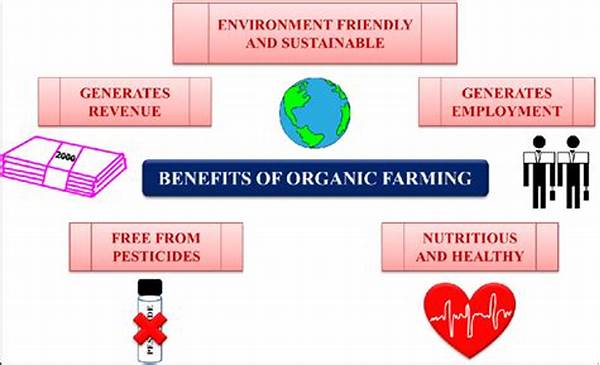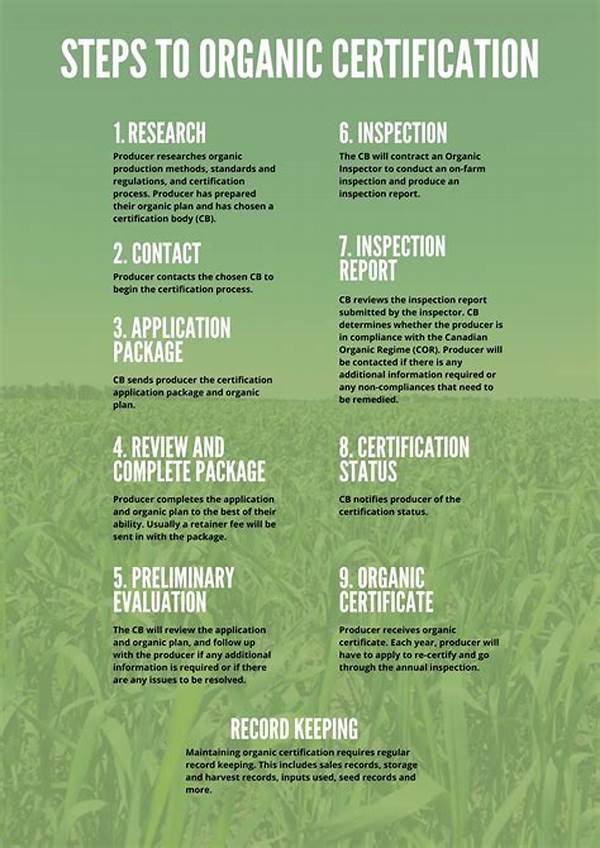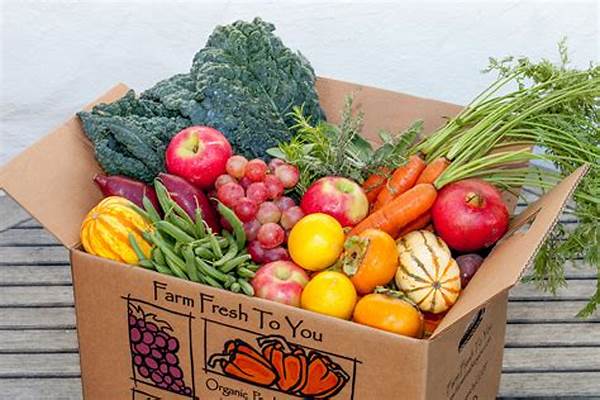In an era where sustainability is at the forefront of global conversations, organic farming emerges as a quintessential solution. Not only does it promise to nurture the environment, but it also provides substantial economic advantages. Embracing organic agriculture can transform the economic landscape for farmers, communities, and nations alike. By investing in organic practices, we are not merely cultivating crops; we are fostering a sustainable future rich with financial opportunities.
Read Now : Non-toxic Tree Treatments
The Financial Impact of Organic Farming
The economic benefits of organic farming are profound and multifaceted. By transitioning from conventional to organic agricultural practices, farmers can achieve higher price premiums on their produce. Consumers are increasingly willing to pay more for food that is healthier and environmentally friendly. This translates to higher profit margins, bringing financial stability to farmers who invest in organic methods.
Furthermore, organic farming reduces the dependency on expensive chemical inputs like synthetic fertilizers and pesticides. By relying on natural alternatives, farmers can significantly cut down on costs, thereby increasing their net income. Beyond individual profits, the shift towards organic farming can stimulate local economies by increasing demand for organic inputs and services, creating a ripple effect of financial growth at the community level.
Moreover, organic farming practices contribute to improved soil health, which can lead to increased crop yields over time. Healthy soil conserves water, improves biodiversity, and enhances resilience against climate uncertainties. As a result, farmers can experience more consistent and reliable yields, which are crucial for long-term financial planning. Collectively, these factors illustrate how the economic benefits of organic farming can foster both individual prosperity and broader economic resilience.
Key Drivers of Economic Growth in Organic Farming
1. Premium Pricing Opportunities: Organic products command higher market prices, leading to increased profitability for farmers committed to sustainable practices.
2. Reduced Input Costs: By minimizing the use of costly synthetic chemicals, organic farming decreases expenses, allowing farmers to retain more of their earnings.
3. Soil Health and Increased Yields: Effective organic practices enhance soil health, leading to improved crop yields and thus greater economic returns.
4. Job Creation and Community Growth: As organic farming expands, it creates job opportunities and strengthens local economies through increased demand for organic goods and services.
5. Market Expansion: The rising consumer demand for organic products opens new markets domestically and internationally, facilitating growth for farmers who innovate and adapt.
Long-term Sustainability of Organic Farming
The economic benefits of organic farming extend well beyond immediate financial gains. Its sustainable approach ensures that future generations of farmers can continue to prosper without depleting natural resources. By preserving the health of the soil, organic farming contributes to long-term agricultural productivity, ensuring continuous revenue streams for farmers.
Additionally, organic farming encourages a circular economy, where waste is minimized, and every aspect of the agricultural process is optimized for environmental and economic efficiency. This not only protects ecosystems but also solidifies the financial baseline for farmers, shielding them from the volatility often associated with conventional farming methods reliant on petrochemicals and monocultures.
By investing in research and innovation within the organic sector, new farming techniques can further boost productivity and profitability, reinforcing the economic benefits of organic farming. As technology and organic practices converge, the prospects for financial success become ever more promising for farmers who embrace sustainable methodologies.
Read Now : Biodiversity In Organic Farming
Community Building through Organic Farming
Economic benefits of organic farming do not stop at the individual farmer; they reverberate throughout communities. Organic farming practices foster community development by encouraging local food systems and reducing the carbon footprint across supply chains. This communal growth facilitates economic resilience, with local farmers supporting local businesses and vice versa.
Moreover, as farmers transition to or start with organic practices, educational opportunities arise. Training programs and knowledge-sharing networks not only uplift farmers but also stimulate entrepreneurship within the community. Organic farming ignites a sense of local pride and collective achievement, thus adding social value to the economic gains.
Innovation and Economic Incentives
Innovation is at the heart of the economic benefits of organic farming. Continuous advancements in organic agricultural technology and techniques enable farmers to optimize productivity and maximize profits. Governments and private sectors play a crucial role by offering financial incentives, subsidies, and grants to encourage the adoption of organic practices, thereby reducing the initial financial barriers that new organic farmers might face.
As consumer demand for organic products continues to soar, farmers who innovate and adapt are poised to capture significant market share. These economic opportunities not only ensure short-term profitability but also pave the way for sustained economic growth and stability in the agricultural sector.
The Role of Policy in Promoting Organic Economic Growth
The economic benefits of organic farming can be significantly amplified through supportive policies. Governments that implement policies encouraging organic farming help create a robust framework for farmers to thrive economically. Tax incentives, subsidies, and research funding dedicated to organic agriculture can drive transformative growth within this sector.
Organic certification programs underpinned by clear standards ensure consumer trust and market expansion. By fostering an environment where organic farming is incentivized and recognized, policymakers can catalyze substantial economic growth driven by organic agriculture.
Conclusion: Embracing Organic for a Prosperous Future
The economic benefits of organic farming are undeniable and extend across multiple facets of the agricultural landscape. By investing in organic practices, we unlock opportunities for higher returns, reduced costs, and sustainable growth. Empowering farmers with the tools and knowledge to transition to organic farming ensures not only their financial success but also the prosperity and resilience of entire communities.
Adopting organic farming practices is no longer just an environmental choice; it is a strategic economic decision that promises a sustainable and prosperous future. As we continue to advance and innovate, the potential for organic farming to revolutionize the economy becomes increasingly apparent, offering hope for both current and future generations.



